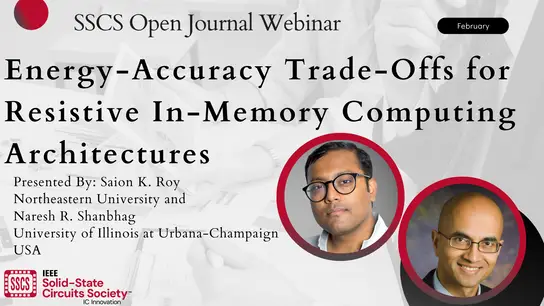-
Members: FreeSSCS
IEEE Members: $8.00
Non-members: $12.00
16 Jul 2019
ABSTRACT
Many of today�s technological marvels have emerged from putting apparently unrelated ideas together and creating something more than the sum of the parts. Silicon integrated chips have come a long way from the days of first transistors. Nowadays, we can place billions of transistors operating at extremely high frequencies on a single chip as well as optical component. This offers a plethora of new opportunities that prior silicon chips could not address. In this talk, I will discuss a holistic design approach to integrated circuits leading to yet further proliferation of such technologies into our daily lives. We will discuss some of its exciting results, including low-cost tera-hertz imagers, nano-photonic coherent cameras capable of forming 3D images, optical phased arrays, space-based solar power transfer, self-healing circuits that repair themselves, and medical diagnostic and therapeutic devices solutions based on electromagnetic sensing and manipulation.
BIO Professor Hajimiri�s group does research on electronics and photonics integrated circuits and their applications in various disciplines, including high-frequency and high-speed communications, sensing, imaging, and bio-sensing. His research group engages in both the theoretical analysis of the problems in integrated circuits as well as practical implementations of new systems.
Prof. Ali Hajimiri received his B.S. degree in Electronics Engineering from the Sharif University of Technology, and M.S. and Ph.D. degrees in electrical engineering from the Stanford University.
Before joining the Faculty of Caltech, he worked at Philips Semiconductors, where he worked on a BiCMOS chipset for GSM and cellular units, at Sun Microsystems
working on the UltraSPARC microprocessor�s cache RAM design methodology, and with Lucent Technologies (Bell Labs), Murray Hill, NJ, where he investigated low-phase-noise integrated oscillators. In 1998, he joined the Faculty of the California Institute of Technology, Pasadena, where he is Bren Professor of Electrical Engineering and Medical Engineering, Director of Caltech Holistic Integrated Circuit Laboratory, and co-Director of the Space-based Solar Power Project. His research interests are high-speed and high-frequency electronics and photonics integrated circuits for applications in sensors, biomedical devices, photonics, and communication systems.
Prof. Hajimiri is the author of The Design of Low Noise Oscillators (Boston, MA: Springer) and has authored and coauthored close to 200 refereed journal and conference technical articles. He has been granted more than 90 U.S. patents and has many more pending applications. He has served on the Technical Program Committee of the International Solid-State Circuits Conference (ISSCC), as an Associate Editor of the IEEE Journal of Solid-State Circuits (JSSC), as an Associate Editor of IEEE Transactions on Circuits and Systems (TCAS): Part-II, a member of the Technical Program Committees of the International Conf
erence on Computer Aided Design (ICCAD), Guest Editor of the IEEE Transactions on Microwave Theory and Techniques, and Guest Editorial Board of Transactions of Institute of Electronics, Information and Communication Engineers of Japan (IEICE).
He is a Fellow of National Academy of Inventors (NAI). Prof. Hajimiri was selected to the TR35 top innovator�s list. He is also a Fellow of IEEE and has served as a Distinguished Lecturer of the IEEE Solid-State and Microwave Societies. He is the recipient of Caltech�s Graduate Students Council Teaching and Mentoring award as well as the Associated Students of Caltech Undergraduate Excellence in Teaching Award. He was the Gold medal winner of the National Physics Competition and the Bronze Medal winner of the 21st International Physics Olympiad, Groningen, Netherlands. He was a co-recipient of the IEEE Journal of Solid-State Circuits Best Paper Award of 2004, the International Solid-State Circuits Conference (ISSCC) Jack Kilby Outstanding Pap
Many of today�s technological marvels have emerged from putting apparently unrelated ideas together and creating something more than the sum of the parts. Silicon integrated chips have come a long way from the days of first transistors. Nowadays, we can place billions of transistors operating at extremely high frequencies on a single chip as well as optical component. This offers a plethora of new opportunities that prior silicon chips could not address. In this talk, I will discuss a holistic design approach to integrated circuits leading to yet further proliferation of such technologies into our daily lives. We will discuss some of its exciting results, including low-cost tera-hertz imagers, nano-photonic coherent cameras capable of forming 3D images, optical phased arrays, space-based solar power transfer, self-healing circuits that repair themselves, and medical diagnostic and therapeutic devices solutions based on electromagnetic sensing and manipulation.
BIO Professor Hajimiri�s group does research on electronics and photonics integrated circuits and their applications in various disciplines, including high-frequency and high-speed communications, sensing, imaging, and bio-sensing. His research group engages in both the theoretical analysis of the problems in integrated circuits as well as practical implementations of new systems.
Prof. Ali Hajimiri received his B.S. degree in Electronics Engineering from the Sharif University of Technology, and M.S. and Ph.D. degrees in electrical engineering from the Stanford University.
Before joining the Faculty of Caltech, he worked at Philips Semiconductors, where he worked on a BiCMOS chipset for GSM and cellular units, at Sun Microsystems
working on the UltraSPARC microprocessor�s cache RAM design methodology, and with Lucent Technologies (Bell Labs), Murray Hill, NJ, where he investigated low-phase-noise integrated oscillators. In 1998, he joined the Faculty of the California Institute of Technology, Pasadena, where he is Bren Professor of Electrical Engineering and Medical Engineering, Director of Caltech Holistic Integrated Circuit Laboratory, and co-Director of the Space-based Solar Power Project. His research interests are high-speed and high-frequency electronics and photonics integrated circuits for applications in sensors, biomedical devices, photonics, and communication systems.
Prof. Hajimiri is the author of The Design of Low Noise Oscillators (Boston, MA: Springer) and has authored and coauthored close to 200 refereed journal and conference technical articles. He has been granted more than 90 U.S. patents and has many more pending applications. He has served on the Technical Program Committee of the International Solid-State Circuits Conference (ISSCC), as an Associate Editor of the IEEE Journal of Solid-State Circuits (JSSC), as an Associate Editor of IEEE Transactions on Circuits and Systems (TCAS): Part-II, a member of the Technical Program Committees of the International Conf
erence on Computer Aided Design (ICCAD), Guest Editor of the IEEE Transactions on Microwave Theory and Techniques, and Guest Editorial Board of Transactions of Institute of Electronics, Information and Communication Engineers of Japan (IEICE).
He is a Fellow of National Academy of Inventors (NAI). Prof. Hajimiri was selected to the TR35 top innovator�s list. He is also a Fellow of IEEE and has served as a Distinguished Lecturer of the IEEE Solid-State and Microwave Societies. He is the recipient of Caltech�s Graduate Students Council Teaching and Mentoring award as well as the Associated Students of Caltech Undergraduate Excellence in Teaching Award. He was the Gold medal winner of the National Physics Competition and the Bronze Medal winner of the 21st International Physics Olympiad, Groningen, Netherlands. He was a co-recipient of the IEEE Journal of Solid-State Circuits Best Paper Award of 2004, the International Solid-State Circuits Conference (ISSCC) Jack Kilby Outstanding Pap
Primary Committee:
SSCS


